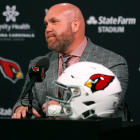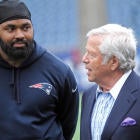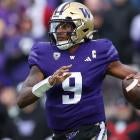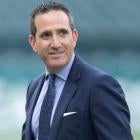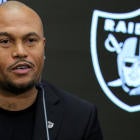What a time to be an NFL general manager!
Results, you may have noticed, don't really matter all that much. You don't have to take the blame or deal with the media or manage personalities the way a coach does, and it's never been easier to fail – or at least lose more than you win – and keep your GM gig while firing a head coach or, in the case of the Browns and Packers this season, two. You get to sit in the cozy confines of a luxury suite with constant access to the owner, cultivating that ever-important relationship and pointing out all the stupid stuff the dude in the headset running things on the sidelines is doing.
The fact that a quarter of the league was searching for a new head coach this month, while only one team made a general manager change (and even that was nominal as Jon Gruden barely spoke to anyone before hiring Mike Mayock out of the TV booth), garnered plenty of attention as this process began. The fact that several teams that woefully underachieved by any standard – like the Falcons, Jaguars, Cardinals, Broncos, Packers, Bengals, Lions and Vikings – made nary a single move to alter their power structure or decision-making process at the general manager level or higher is staggering enough. The fact that most owners involved did not even consider it should scare the heck out of some of these fanbases.
But the power of this movement actually runs much deeper than that, because with the coaching cycle closing and the dust settling, it's more clear now than ever that GMs aren't just enjoying remarkable job security, they are also being empowered like rarely before. In most of these coaching hires, the GM exerted extreme control, to the point the head coach is really just a glorified offensive coordinator, or quarterback coach, who enters his new job without anything close to full command over his full staff, much less the ability to assemble a full staff. Let's be real, a lot of these hires are made with the preservation of the GM in mind, and these were take-it-or-leave-it propositions for many coaching candidates: assume the job under these conditions or look elsewhere for work.
A shift in philosophy
There has been a paradigm shift, by and large, within the game that somewhat rivals what has long been afoot in baseball. A team-president-type controls day-to-day operations and the owner's purse and budgets and gets to pull the strings; the general manager oversees football operations, and they, along with ownership, pick a certain model they want in a head coach (in essence picking a scheme and style of coach – most often a QB-whisperer/offensive play caller … young and white and good looking and with ties to Rams coach Sean McVay if possible, please!). And then they go about finding one to take their job. It's not quite as analytically driven as in MLB, where numbers-centric front offices find a skipper to embody their philosophy and strongly suggest daily line-up variations and strategy decisions. But it's creeping closer than ever before.
It is undeniable that the crux of this offseason thus far has been about finding a QB guy to develop a young passer, with the Broncos hiring 60-year-old career defensive coordinator Vic Fangio the exception to the rule, on the surface. But even that decision actually fits within this GM/team president power-play trend, as Fangio runs the defense and was set to assume an offensive staff that, at the time, was going to be run by former Broncos head coach turned former Broncos personnel executive Gary Kubiak (who wanted to handle much of the offensive staffing). Ultimately, the Broncos hired who they deemed the best defensive coordinator possible, taking Fangio over offensive line coach and former NFL head coach Mike Munchak. Then, the team and Kubiak clashed over the full composition of Kubiak's staff, so that uber-accomplished coach said, "bleep it," and he's out, too, and the Broncos want to bring Munchak in to run their offense.
You can't make this stuff up.
If you still haven't marked your calendar for the Super Bowl, the game will be kicking off from Atlanta on Feb. 3 and will be televised by CBS and you can stream it right here. If you're thinking about buying a new TV for the big game, CNET has you covered. They shared their best picks for every budget.
Coach hirings have similar look
The Cardinals, oh I'm sorry, the Kardinals, couldn't wait to point out in their official announcement of Kliff Kingsbury as head coach on their website that Kingsbury was boys with McVay, who they also deemed a "genius," and had studied ball with him the past. Thank Goodness. Now I get it! (The Kardinals eventually went back to being the Cardinals on social media and also yanked the references to McVay from their website, too). I mean, without the McVay ties, how you could justify the hiring a guy who just got run out of Lubbock, Texas for not winning nearly enough in the Big 12? What a relief.
And while Kingsbury, who didn't stick around as USC's coordinator long enough to print out a playbook, will be coaching the heck out of the QBs and WRs, GM Steve Keim made it clear at the press conference that the team will return to a 3-4 defense and that Keim, and not the coach, will in essence be hiring the defensive staff. Of course, they just hired a former defensive coordinator to change them from a 4-3 about 11 months ago and were ready to fire Steve Wilks about 12 games into his first season as an head coach. But, sure, this totally adds up.
The Packers – perhaps the most iconic professional sports franchise in this country – couldn't wait to offer Matt LaFleur their job within hours of meeting with him, despite LaFleur calling plays for only one year for a tepid-at-best Titans offense and holding the offensive coordinator position in title alone under McVay in 2017. LaFleur was ever-willing to be saddled with a hodgepodge of McCarthy's remaining staff from 2018, including virtually the entire defensive side of the ball (which saves de-facto owner Mark Murphy and the team plenty of money). He'll come in making far less than the roughly $8.6M McCarthy will be paid by Green Bay not to coach them next season, and a year after picking his preferred division of labor in the front office, Murphy has now found a young and malleable head coach to carry out the process. Moving forward, I'd suggest attaching wins and losses to Murphy's name as well as LaFleur's, since he put this all together and dominated the press conference.
Noticing any trends here?
Now, had McCarthy been willing to take the Cardinals job – considered not very desirable by many top coaches – and take full authority of the building, as owner Michael Bidwell dangled, then we never reach this point in Arizona (and they would have a different GM, too). And had Northwestern coach Pat Fitzgerald been interested in the Packers job, we would never reached this point in Green Bay either. So there are some caveats as to how we got here, but these hires are eerily similar in many ways.
The Jets went through clashes about the potential coordinators and assistant coaches with Baylor head coach Matt Rhule before he withdrew from the position, and then had talks breakdown with McCarthy for similar reasons before hiring Adam Gase. The Browns coaching search included a prevalent push from analytics guru Paul DePodesta, who sources said was a strong proponent of hiring relative newbie play callers Freddie Kitchens or Minnesota offensive coordinator Kevin Stefanski. Choosing Kitchens makes sense, given his work with Baker Mayfield, but he too is taking a job in which certain holdovers from Hue Jackson's staff are going to be retained, and this is not a proven guy coming in guns-a-blazing with full staff in tow (Gregg Williams, the Browns interim head coach who had strong locker room support for the job, was not going to be as pliable on staffing matters, his history would indicate, and he was out).
The only true outlier hire of the initial wave of moves was Tampa Bay with Bruce Arians. Both his age and the fact that he had recently been a head coach who had virtually an entire staff in place to come with him make him the exception to the rule. Of course, he had worked previously with GM Jason Licht, which is also unique to this cycle thus far. Licht already knows he can handle and accept the coach's strong-willed personality, and this is the suddenly-rare instance with the coach having full autonomy over his coordinators. Arians and Gase are also the only men hired who have ever been to the NFL playoffs as head coaches before, and Gase is thus far the only head coach hired who was a head coach in the league in 2018.
Where's the trend headed?
I cannot recall another year in which so many head coaches with this little experience got jobs this quickly and under such unusual circumstances regarding the construction of their staff. It's even more of a head scratcher when you consider the lack of pedigree or results, in large part, among the owners/GMs/team presidents who are doing the hiring and have put these conditions in place. A few days ago I had a former NFL head coach send along a passage, written long ago by the late great Bill Walsh, explaining the dynamics between owners and GMs and personnel guys and coaches:
It read in part: "They put their head together. What do they do? So they get a new coach, obviously in the GM's comfort zone but not too strong to be a threat. The personnel man's going to side with the GM on anything. He knows he where he got his job. So the cycle starts over again. Every seven or eight years a GM is spat out. And the situation continues to exist."
Seems more prescient now than ever.
Perhaps the pendulum begins to swing the other way should we see some more one-and-dones or abrupt disasters from this hiring cycle. Everything is cyclical, I suppose. But owners seem more willing than ever to accept what their football men tell them, regardless of what the standings and rosters suggest, and to impose their will over coaching staffs and put their trust in their personnel departments above all else.













